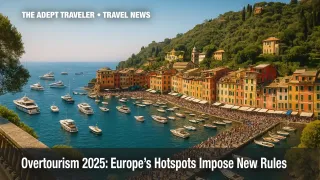Overtourism 2025: Europe's Hotspots Impose New Rules

European overtourism 2025 has reached a tipping point. Summer visitor numbers already exceed pre-pandemic highs, overwhelming postcard villages from Portofino to Santorini. In response, local governments are rolling out stricter dress codes, cruise-ship taxes, and even an end to influencer marketing campaigns, all aimed at easing pressure on fragile communities while preserving tourism's economic lifeline.
Key Points
- Why it matters: Peak-season crowds now top 2019 levels, straining local services.
- Portofino fines barefoot or swim-clad visitors up to €500.
- Santorini introduces a €20 cruise-passenger landing fee and daily caps.
- Balearic Islands halt influencer campaigns to curb "selfie tourism."
- UN Tourism reports Europe up 3 percent above 2019 arrivals in Q1 2025.
Snapshot
Portofino, Santorini, and Spain's Balearics illustrate how differing geographies require tailored antidotes to crowds. The Ligurian harbor has opted for a summer-only urban dress code backed by on-the-spot fines. Greece targets seaborne arrivals with a per-passenger tax that funds port upgrades and island infrastructure. Mallorca's regional government, having watched a tiny cove jump from 100 to 4,000 daily visitors, simply pulled the plug on influencer deals. Each measure underscores a wider continental shift from promotion to management as cities and islands weigh quality of life against tourism revenue.
Background
Before COVID-19, Europe welcomed roughly 746 million international travelers a year. Lockdowns briefly relieved crowding, but pent-up demand has since roared back. UN Tourism's June 2025 Barometer shows the region 3 percent above 2019 arrivals after a 5 percent year-on-year rise in the first quarter. Cheap intra-EU airfares, social-media "bucket-list" culture, and a cruise sector chasing bigger ships funnel traffic into the same photogenic squares and cliffside villages. Locals, priced out of housing and hemmed in by foot traffic, have revived anti-tourism protests from Barcelona to Venice, forcing officials to shift from laissez-faire marketing to crowd control.
Latest Developments
Italy Tightens Coastal Etiquette
Portofino's Mayor Matteo Viacava signed Ordinance 40/2025, in force July 14-September 30. Visitors walking barefoot, shirtless, or in swimwear beyond the beach now face fines from €25 to €500. The decree also bans street picnics, public alcohol consumption, and sitting on walls or sidewalks to "protect the peace and quiet" of the 400-resident town that sees up to 100,000 summer day-trippers. The move follows 2023 "no-stop selfie zones" that fined tourists who lingered at key viewpoints.
Greece Taxes Cruise Arrivals
Seeking to disperse the daily tide of cruise passengers, the Greek Ministry of Tourism unveiled a €20 landing fee for ships calling at Santorini and Mykonos, effective June 1 - September 30. Reduced rates apply in shoulder and off-season months. Revenue is split among municipalities, the Ministry of Shipping for port works, and the Tourism Ministry for destination upgrades. A proposed "saturation law" would further cap Santorini's visitors to 8,000 per day, while a separate decree reserves 75 percent of every beach for public use.
Spain's Balearics End Influencer Push
Mallorca's regional tourism board has scrapped influencer partnerships after viral posts turned secluded coves into lines of selfie-stick wielders. Officials claim the strategy backfired, amplifying crowding instead of dispersing it. The decision dovetails with broader Balearic rules that ban beach smoking, restrict alcohol-fuelled party boats, and fine reckless driving in flip-flops. Meanwhile, mainland cities continue to explore tougher rental caps and cruise limits; Barcelona's recent water-gun protests against mass tourism drew global coverage. (See our in-depth look at those demonstrations here.)
Analysis
For travelers, the era of spontaneous Mediterranean holidays is fading. Dress codes and advance-booking systems now dictate daily plans, while fees once limited to heritage sites have migrated to ferries, beaches, and cruise gangways. Budgets should account for new fines-€500 for street swimwear in Italy, €20 cruise levies in Greece-and for time lost to controlled-entry queues. Yet the upside is a more manageable visitor flow and, officials hope, a restored sense of place for residents. Advisors can steer clients toward uncrowded shoulder seasons, secondary islands such as Naxos or Sifnos, or mainland hubs linked by efficient rail. Clear communication about local rules, from footwear to drone bans, will spare travelers costly surprises and foster goodwill with host communities.
Final Thoughts
The 2025 season proves Europe's overtourism 2025 challenge is no longer theoretical. Whether by fining barefoot wanderers, taxing cruise passengers, or throttling social-media promotion, destinations are signaling that quality must trump sheer volume. Travelers who respect these evolving frameworks will still capture that dream Mediterranean moment-just without elbow-to-elbow crowds. European overtourism 2025 may be the wake-up call both visitors and residents needed.
